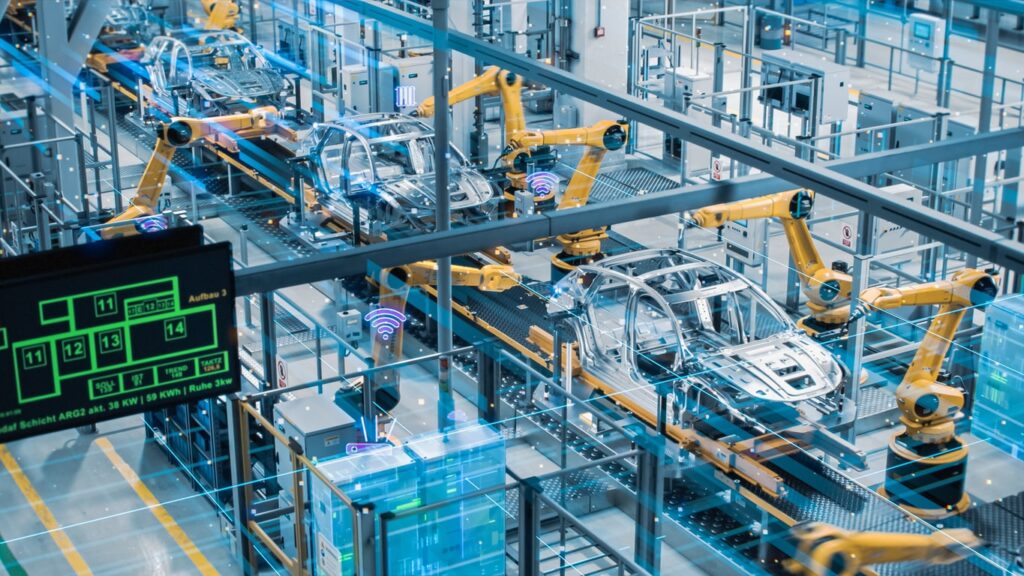Blockchain technology is perhaps most associated with cryptocurrency, but its features are a lot more far-reaching than just digital currencies. In fact, it can be an essential piece of technology across a range of industries in the fast-evolving digital world that we live in today. One of those use cases for blockchain is within smart factories. Among these, blockchain stands out as a game-changer, offering a new paradigm of transparency, security, and efficiency. This article delves into the multifaceted role of blockchain in smart factories, examining how this technology is reshaping the manufacturing landscape.
What is Blockchain Technology?
Blockchain is a type of digital record-keeping system, which works in a series of electronic “blocks”. A collection of transactions or data is contained in each block. Once a block is filled with data, it is linked to the previous block, forming a chain. This chain is stored across a network of computers, making it very secure and hard to tamper with. This type of technology is used mainly for cryptocurrencies like Bitcoin, medical records, smart contracts and supply chain monitoring. Smart factories are revolutionising manufacturing by leveraging advanced technologies like IoT, AI, and blockchain. Blockchain is also one of the top trends leading into 2024.
How is Blockchain Used in Smart Factories?

Supply Chain Transparency and Efficiency
In a traditional supply chain, information asymmetry and the lack of real-time data can lead to inefficiencies, such as overstocking, delays, and fraud. With blockchain, every transaction and movement of goods is recorded and visible to all parties involved in an immutable ledger. In addition to improving confidence between suppliers, manufacturers, and consumers, this feature makes it easier to track and verify goods in real-time.
For example, in the automotive industry, blockchain can trace the journey of auto parts from raw material extraction to assembly. This level of transparency helps in quickly identifying and resolving supply chain disruptions, reducing waste, and ensuring ethical sourcing practices.
Enhanced Security
Due to the decentralised nature of blockchain, data is kept on a network of computers rather than in a single place. As a hacker can’t compromise the entire database, decentralisation greatly lowers the risk of cyberattacks and data breaches. Furthermore, every block is cryptographically hashed to guarantee that any data alteration is readily identifiable.
In manufacturing processes, this is essential for safeguarding sensitive design data and intellectual property. For example, blockchain can offer a secure platform to store and manage vital data in sectors like aerospace or pharmaceuticals, where data integrity is crucial for safety and compliance. Giving auditors a transparent, unchangeable history of data also helps with regulatory compliance by guaranteeing that the manufacturing processes follow the necessary guidelines. Blockchain, then, serves as a fortress, protecting the digital resources of smart factories.

Smart Contracts for Automated Transactions
Among blockchain’s most inventive features in the context of smart factories are smart contracts. These digital contracts have no need for intermediaries and lower the possibility of disputes because they execute automatically when predetermined conditions are met. Smart contracts have the potential to completely transform how business is done in the manufacturing sector. For instance, after a delivery is verified through blockchain, a smart contract could start paying a supplier automatically, guaranteeing accurate and timely payment processing. These contracts can also be used for maintenance agreements, in which money is only paid out when the agreed-upon services have been completed.
Contractual obligations are automated to improve operational efficiency, lower administrative costs, and streamline business processes. Smart contracts facilitate the management of multi-party agreements in industries with intricate supply chains, like electronics and automotive, by guaranteeing transparency and compliance with contractual terms. Smart factories can concentrate on innovation and productivity by automating these processes and entrusting blockchain to handle the transactional aspects in a secure and effective manner.
Quality Control and Compliance
High standards for product quality and safety are guaranteed by blockchain’s capacity to track and record each stage of the manufacturing process. For example, in the food and beverage industry, blockchain can track a product’s journey from farm to table, recording information about handling procedures and temperature control. In the event of a product recall, traceability is essential for pinpointing the cause of problems and restoring consumer confidence and safety.
Blockchain can also assist in regulatory compliance. Blockchain offers a transparent and verifiable record of regulatory compliance for industries where products must meet tight standards, such as aerospace and pharmaceuticals. Blockchain records provide auditors and regulators with the ability to verify that products have been manufactured in compliance with relevant specifications and standards. This lowers the possibility of fraud and non-compliance while simultaneously streamlining the compliance process. Blockchain technology enables smart factories to maintain a high level of compliance and quality, guaranteeing that their products satisfy regulatory and customer expectations.
IoT Integration
The need for safe and effective machine-to-machine communication is growing as factories become more automated and dependent on the Internet of Things (IoT). These devices may be able to exchange data and conduct financial transactions on their own thanks to blockchain technology. Blockchain is used to record and carry out these transactions. For instance, in an automated production line, machines equipped with IoT sensors can communicate maintenance requirements or order parts on their own. This minimises the possibility of human error while also accelerating the process.
Manufacturers can learn about machine health, maintenance needs, and production efficiency by safely gathering and evaluating data from a variety of machines. Predictive maintenance, which involves servicing machines before they break down to reduce downtime and boost productivity, may result from this integration. Essentially, blockchain serves as the foundation for machine-to-machine (M2M) transactions in smart factories, facilitating a more autonomous, efficient, and intelligent manufacturing setting.

Challenges of Blockchain in Smart Factories
Although blockchain has a wealth of benefits for smart factories, there are some considerations that need to be taken seriously. Some of these include:
- Energy consumption – certain blockchain models are criticised for their high energy consumption, as a result of their complex cryptographic calculations. For smart factories aiming to be greener, this could be a stumbling block.
- Technical complexity – The technical implementation of blockchain in a smart factory setting is challenging. It can be difficult to integrate blockchain with current legacy systems and procedures since it frequently necessitates major adjustments to the IT infrastructure. Factories may need to implement new standards and protocols in order to make sure that their systems can interact with the blockchain.
- Scalability concerns – Blockchain networks, particularly those using proof-of-work consensus mechanisms, can face scalability issues. As the number of transactions increases, the processing speed can slow down, and the energy consumption can increase significantly. For smart factories that need to process data in real-time and be energy efficient, this is a major concern.
- Initial costs – Implementing blockchain technology can come with a hefty upfront cost that covers expenses for professional services, software, and hardware. Small and medium-sized businesses may find it especially difficult to demonstrate the return on investment after the initial expenditures and continuing upkeep.
Conclusion
The integration of blockchain into smart factories represents a significant advancement in manufacturing, promising enhanced efficiency, greater transparency, and heightened security. Despite obstacles like scalability concerns, energy consumption, and initial costs, the potential advantages are substantial. Blockchain is a major factor in the development of smart manufacturing because of its capacity to automate transactions, maintain product integrity, and optimise supply chains.











